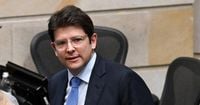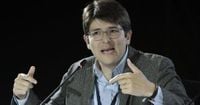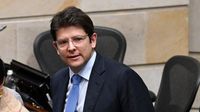On June 7, 2025, Colombian Senator Miguel Uribe Turbay, a 39-year-old conservative opposition leader and presidential hopeful, was shot during a campaign event in the Fontibon district of Bogotá. The attack sent shockwaves through Colombia’s political landscape, marking the first assassination attempt on a high-profile political figure in decades, harkening back to the violent era of drug lord Pablo Escobar in the early 1990s.
Uribe, a member of the right-wing Democratic Center party founded by former President Álvaro Uribe (to whom he is not related), was campaigning to become his party’s candidate in the 2026 presidential elections when armed assailants shot him in the back. Videos circulating on social media showed Uribe bleeding from the head and back, with bystanders desperately trying to stem the bleeding and carry him to safety. Mayor Carlos Fernando Galán confirmed the arrest of a suspect, identified as a minor, shortly after the shooting. Defense Minister Pedro Sánchez announced a reward of 3 billion Colombian pesos (approximately $728,000) for information leading to the capture of all those responsible.
At the time of the attack, Uribe was in critical condition and receiving emergency medical care. Attorney General Luz Adriana Camargo stated he was in intensive care. The exact motive behind the shooting remains unclear, but it occurred amid escalating political tension in Colombia. President Gustavo Petro, the country’s first left-wing president, has been pushing labor reforms strongly opposed by Uribe and other conservative leaders. Uribe has been a vociferous critic of Petro’s leftist policies, warning publicly about Colombia’s backslide into violence and instability.
Uribe’s political platform emphasizes law and order, economic stability, and pro-business policies. Educated at Colombia’s Universidad de los Andes and Harvard’s Kennedy School, he has gained prominence in the Senate, winning more votes than any other candidate in 2022. His campaign rhetoric has frequently highlighted concerns about security and institutional stability, with Uribe stating just days before the attack, “They are dragging us back to a past of violence we don’t want to return to.”
The Democratic Center party swiftly condemned the shooting as “an unacceptable act of violence” and “an attack on democracy and freedom in Colombia.” Their statement underscored the gravity of the incident, emphasizing that the attack endangered not only a political leader’s life but also the democratic fabric of the nation.
President Gustavo Petro expressed his solidarity with Uribe’s family on social media, writing, “I don’t know how to ease your pain. It is the pain of a mother lost, and of a wounded homeland.” The Colombian presidency issued a formal statement categorically rejecting the violent attack and calling for a thorough investigation, describing the shooting as “an attack not only against his person, but also against democracy, freedom of thought, and the legitimate exercise of politics in Colombia.”
Foreign Minister Laura Sarabia condemned the violence, tweeting, “Violence can never be the way… I sincerely hope that (Uribe) is well and out of danger.” The Colombian foreign ministry also called the attack a “direct affront to democracy, respect for differences, and the free exercise of politics in our country,” urging authorities to fully clarify the incident.
The shooting drew widespread condemnation from political figures across Colombia and beyond. At least four former Colombian presidents—Ernesto Samper, Álvaro Uribe, Juan Manuel Santos, and Iván Duque—issued statements denouncing the violence. Ecuadorian President Daniel Noboa sent prayers to Uribe’s family, condemning all forms of violence and intolerance. The United Nations Human Rights office in Bogotá called for an investigation and justice, emphasizing the need to guarantee political rights and a political debate free from violence.
U.S. Secretary of State Marco Rubio also condemned the attack, calling it “a direct threat to democracy and the result of the violent leftist rhetoric coming from the highest levels of the Colombian government.” Rubio urged President Petro to “dial back the inflammatory rhetoric and protect Colombian officials,” warning that Colombia cannot afford to revert to the dark days of political violence.
The defense minister, Pedro Sánchez, confirmed the arrest of one suspect and indicated ongoing investigations to determine if others were involved. He ordered the military, national police, and intelligence agencies to deploy all their capabilities to urgently clarify the facts. Sánchez also announced an extraordinary meeting with military and police leadership to outline a strategy to address the situation, emphasizing that the attack “mobilizes us to redouble our efforts to protect life, guarantee free political participation, and deliver justice.”
The attack has rattled Colombia, a country that has made significant strides in security and democratic governance over recent decades. The assassination attempt on a sitting senator and presidential candidate is a grim reminder of the persistent challenges the nation faces amid political polarization and ongoing conflicts involving armed groups, mostly concentrated in rural areas.
Uribe’s personal history adds a poignant layer to the tragedy. He is the grandson of former President Julio César Turbay and the son of Diana Turbay, a journalist who was tragically killed in 1991 during a rescue operation after being kidnapped by Pablo Escobar’s Medellín cartel. This connection to Colombia’s violent past underscores the deep scars that still influence the country’s present-day politics.
As Uribe fights for his life, Colombia grapples with the implications of this brutal attack on its democracy. The shooting has sparked urgent calls for unity, security, and a renewed commitment to peaceful political discourse. In a country where political violence once dominated headlines, the hope is that this incident will serve as a catalyst to reinforce democratic values and protect the rights and safety of all political actors.
This developing story continues to unfold as authorities work to uncover the full circumstances behind the assassination attempt and ensure justice is served.



